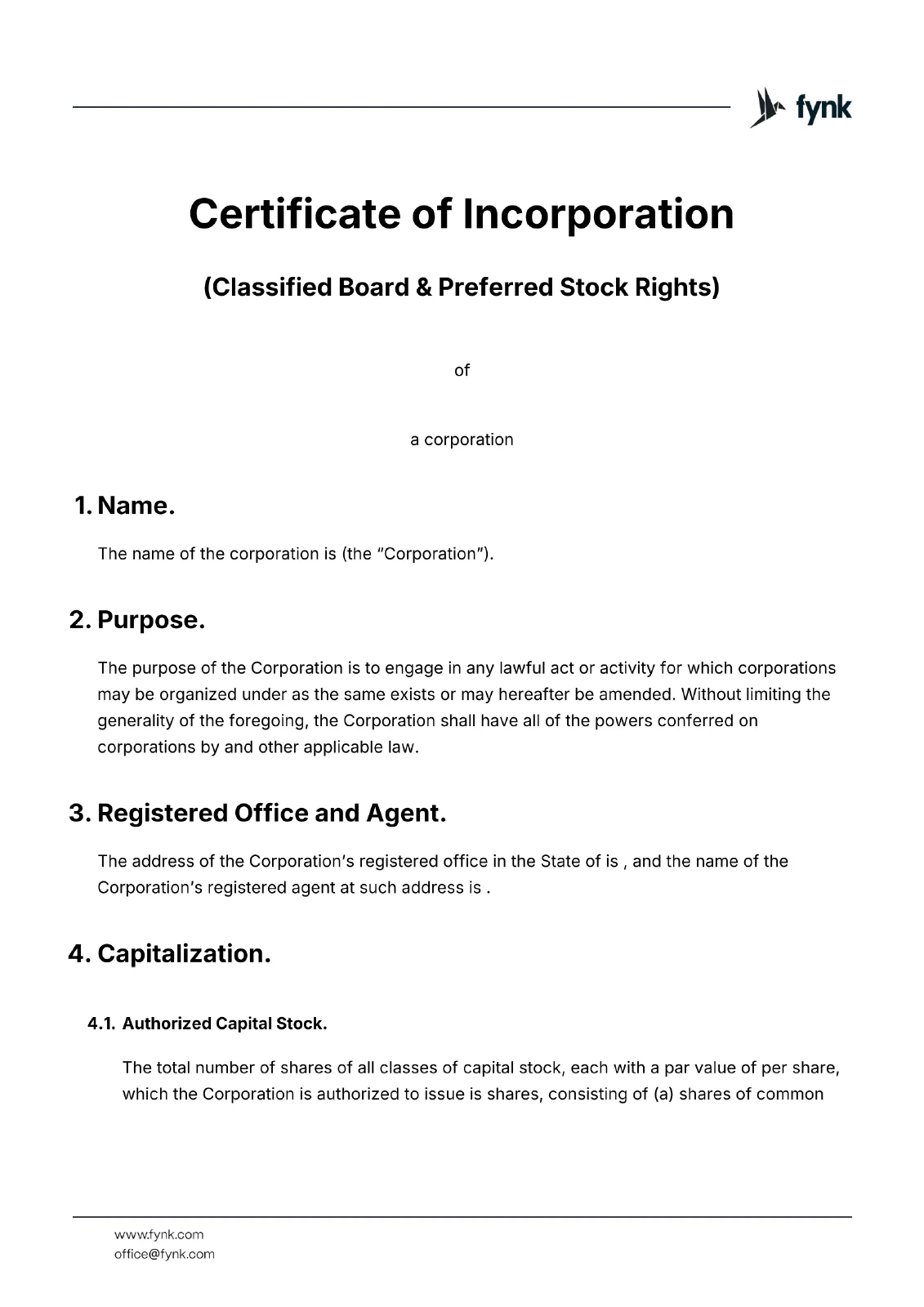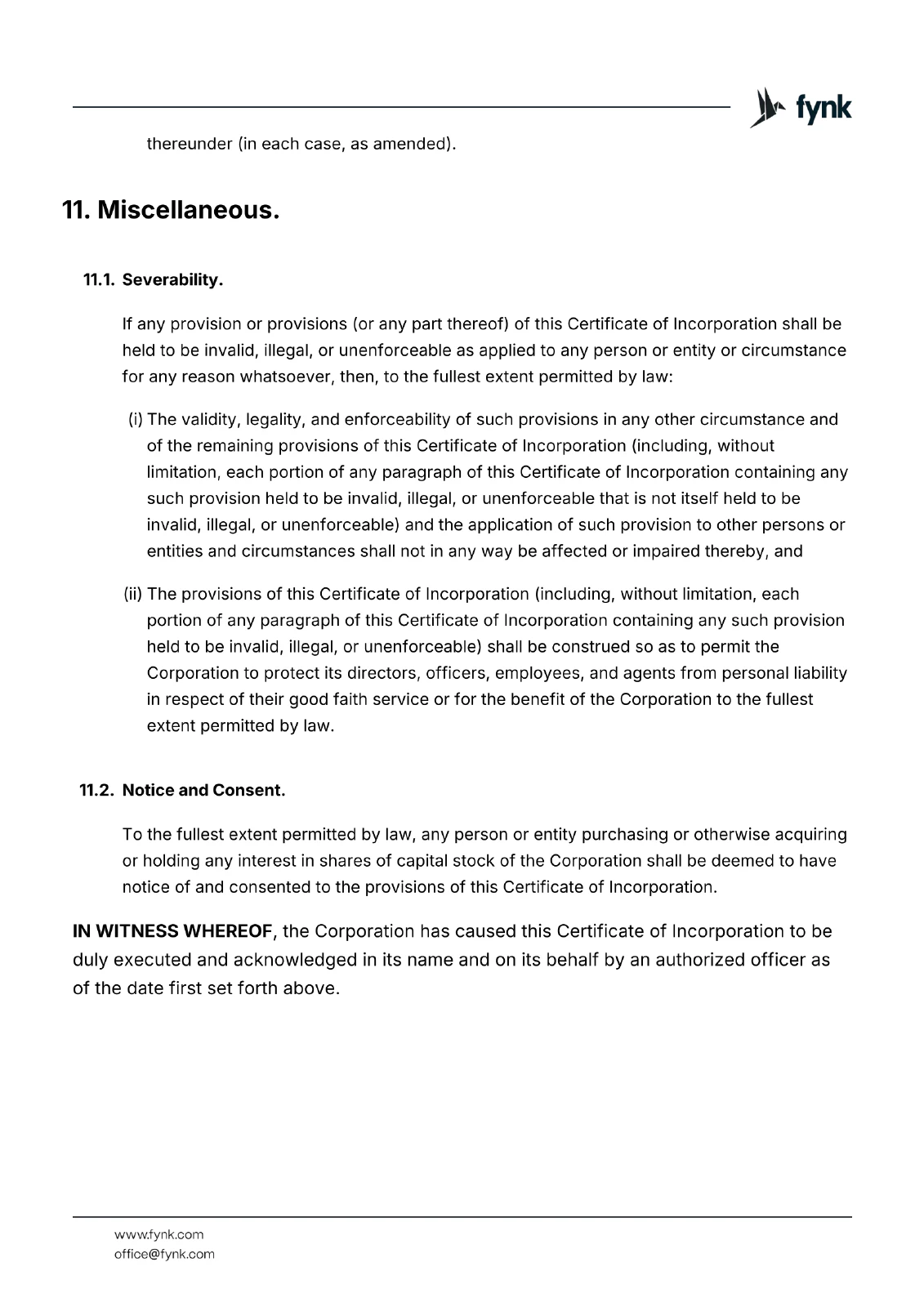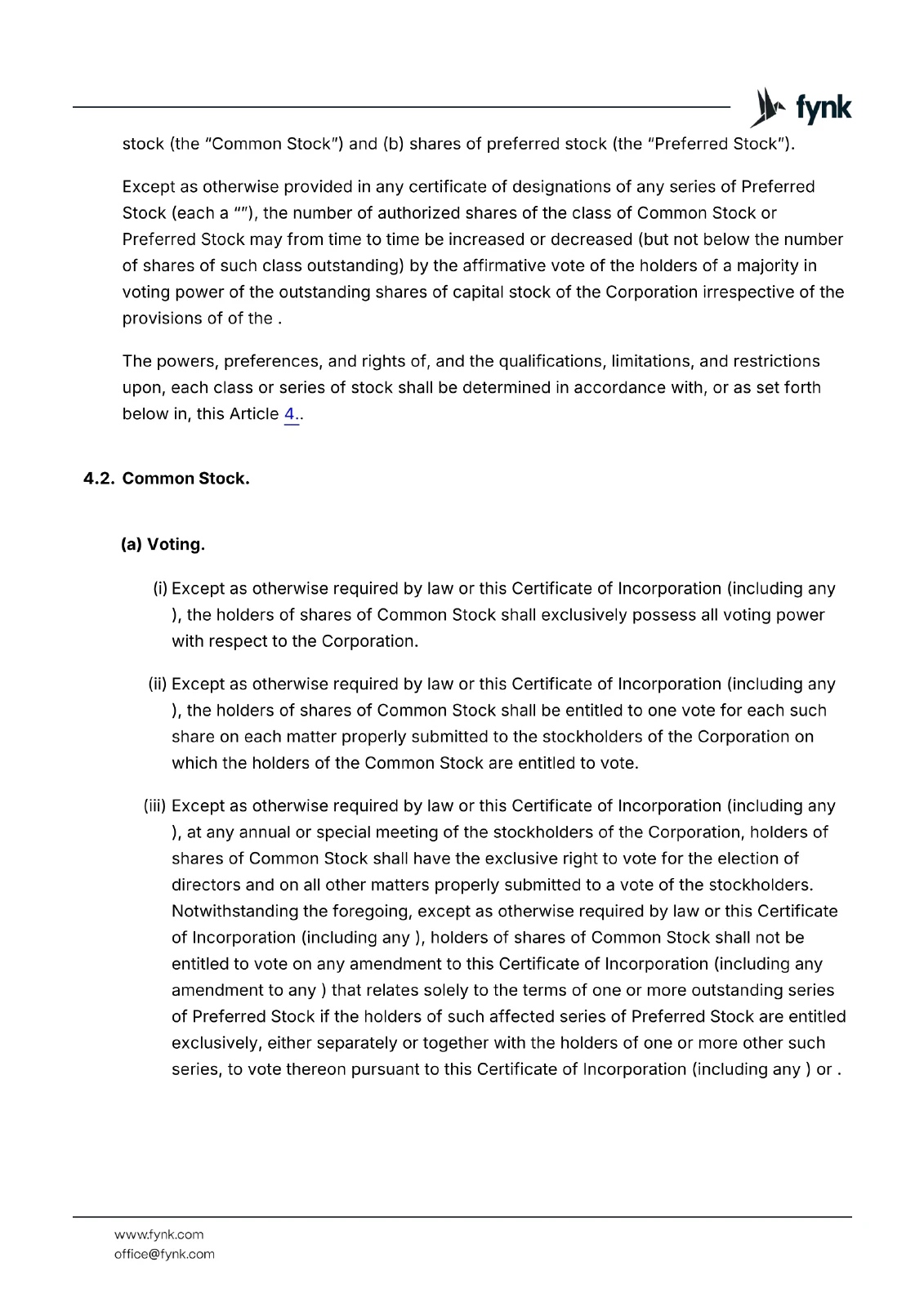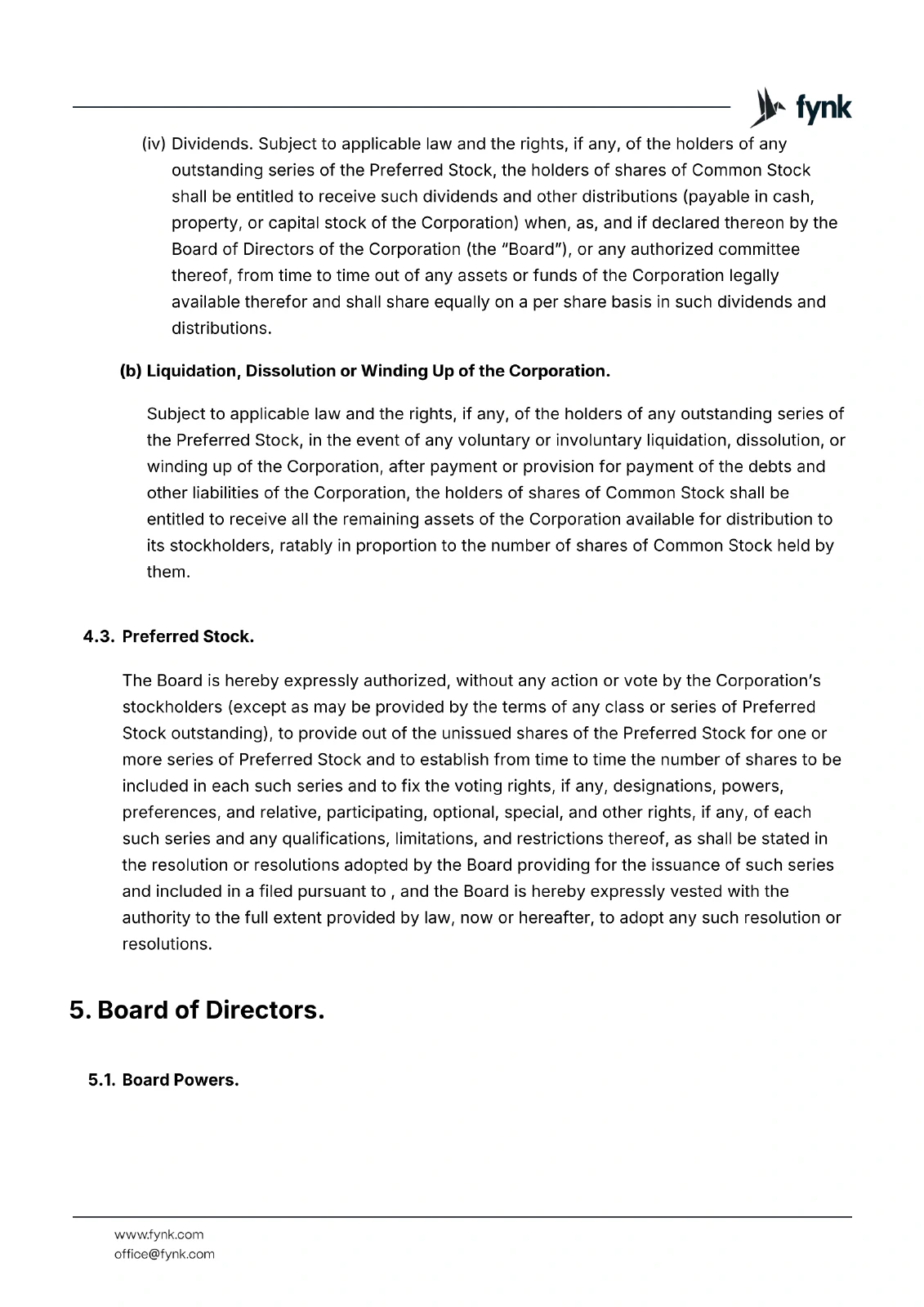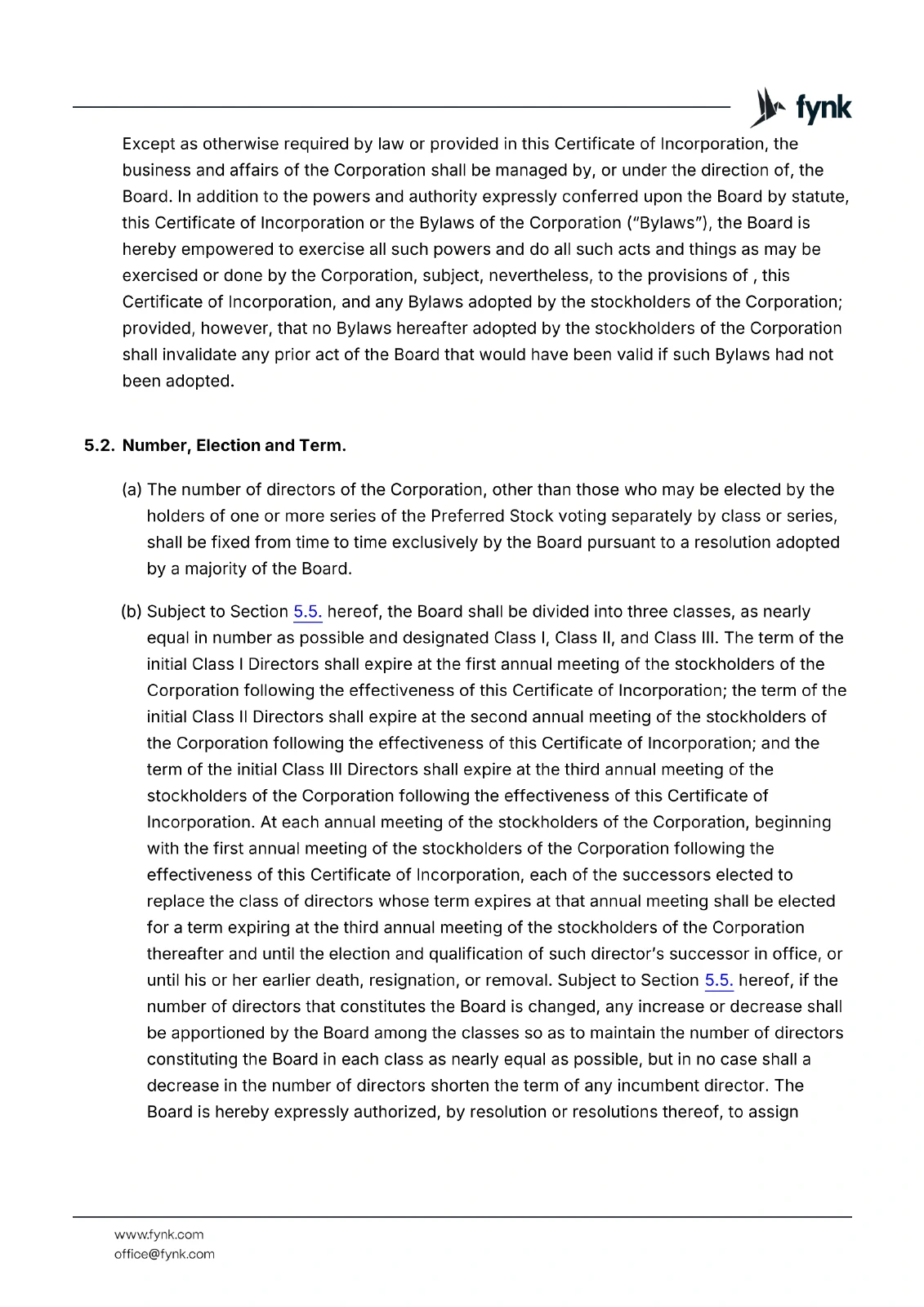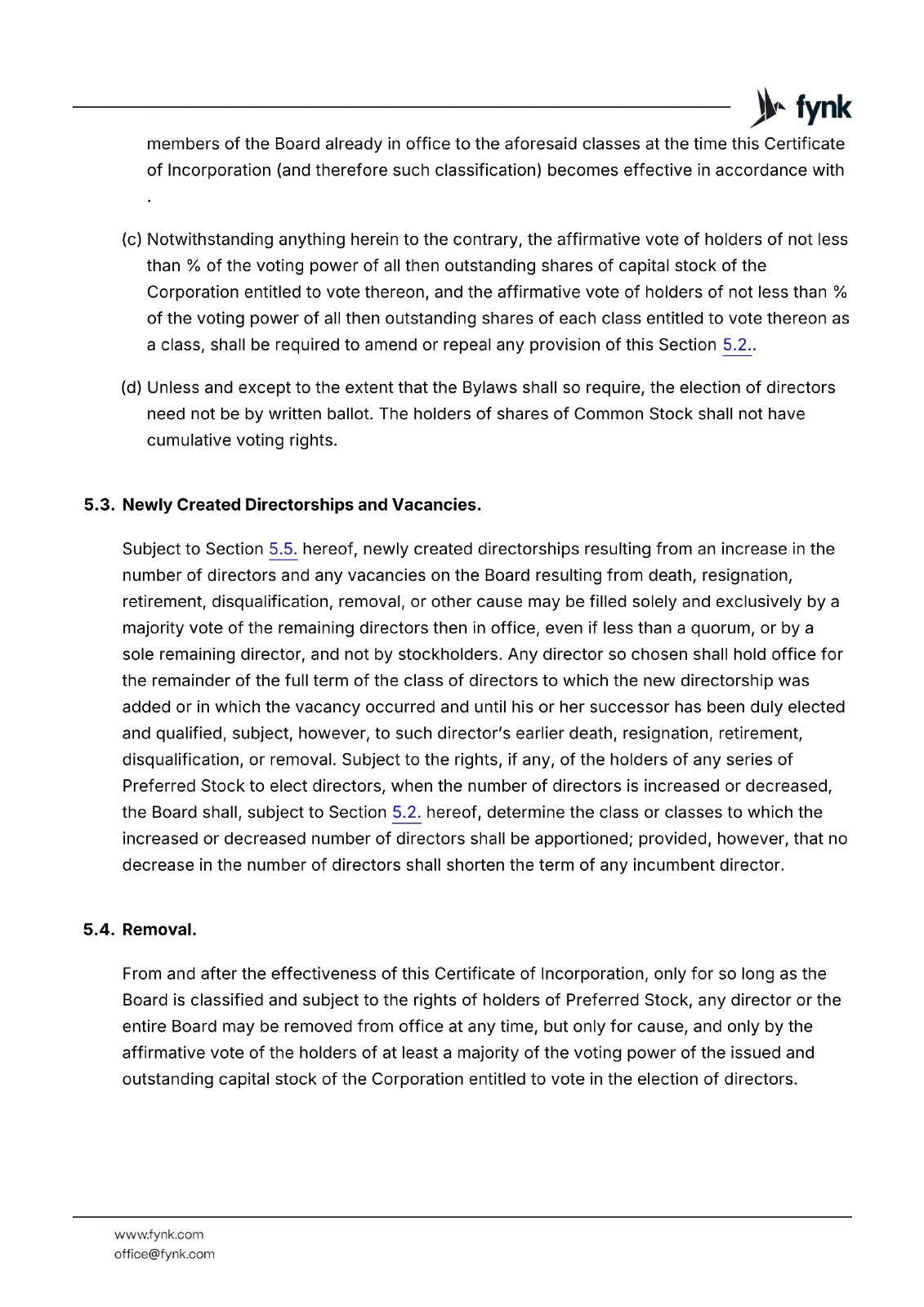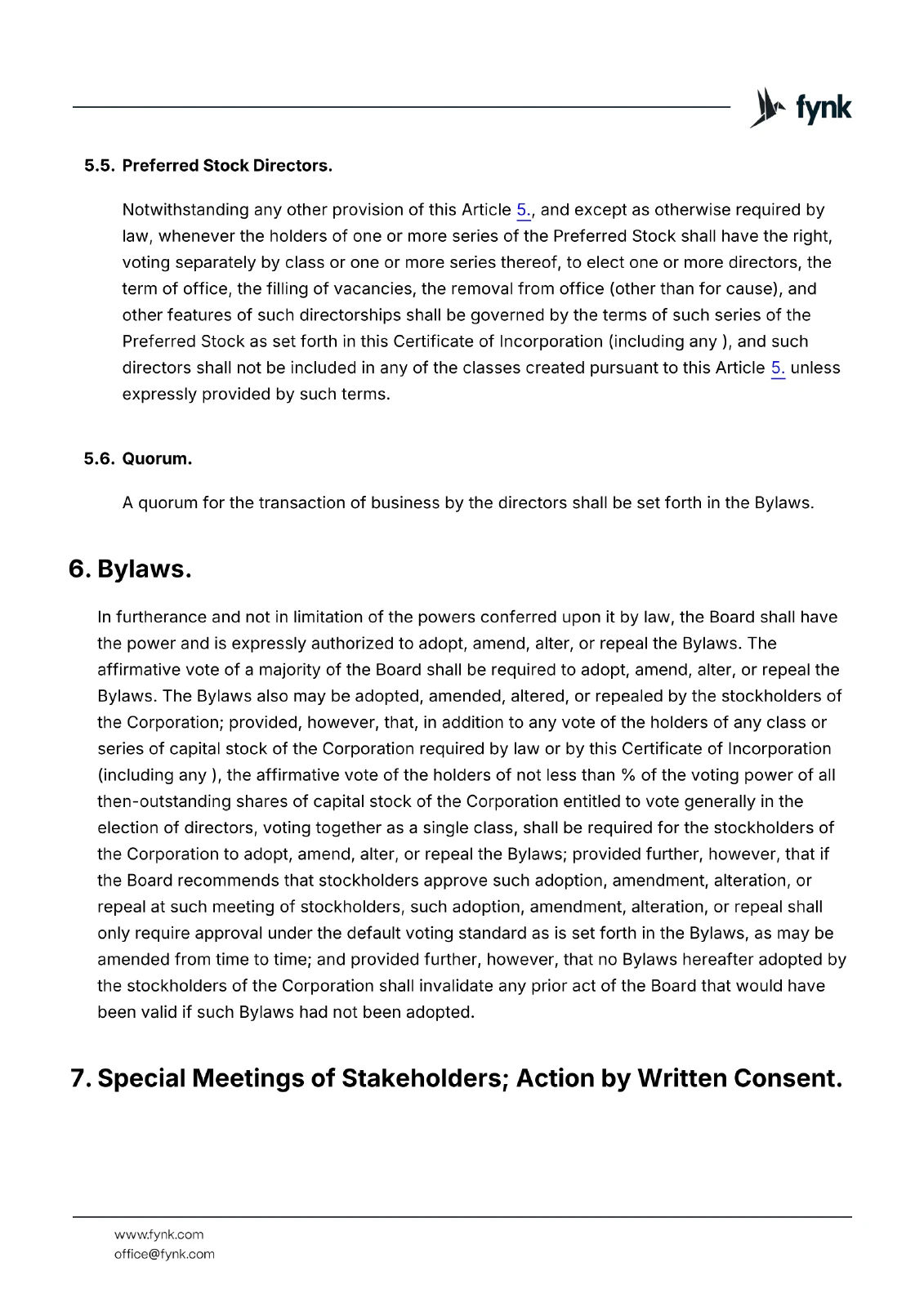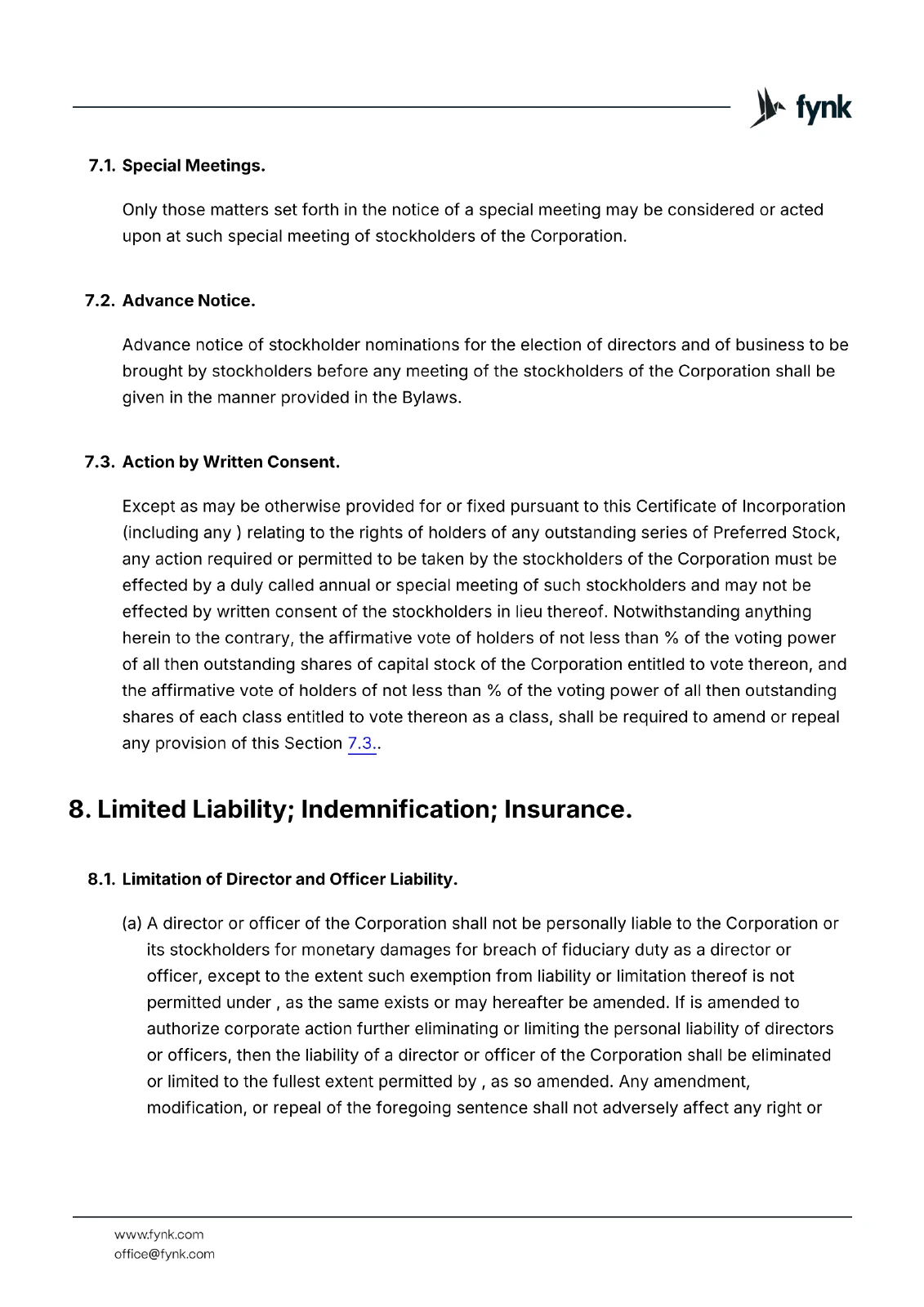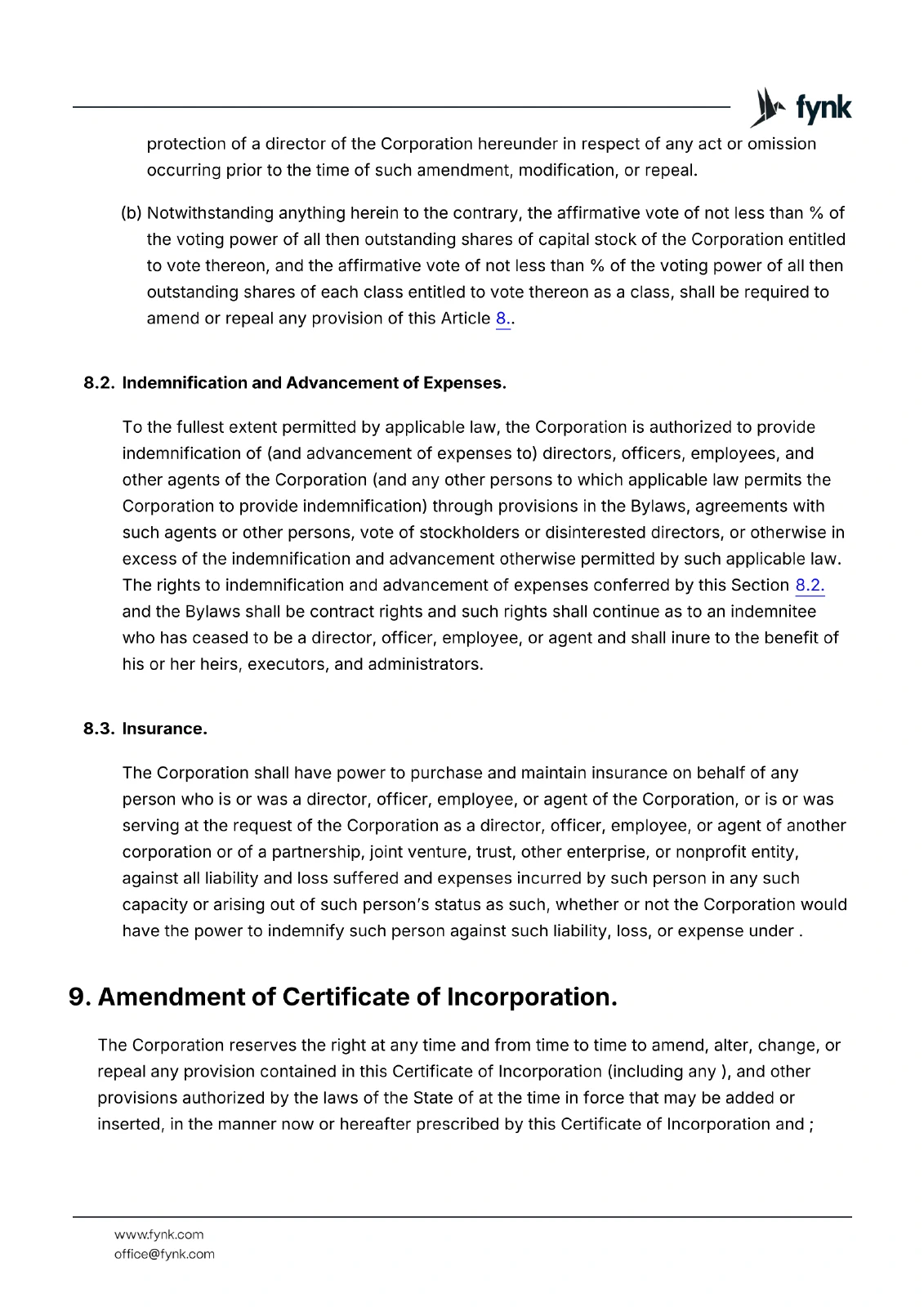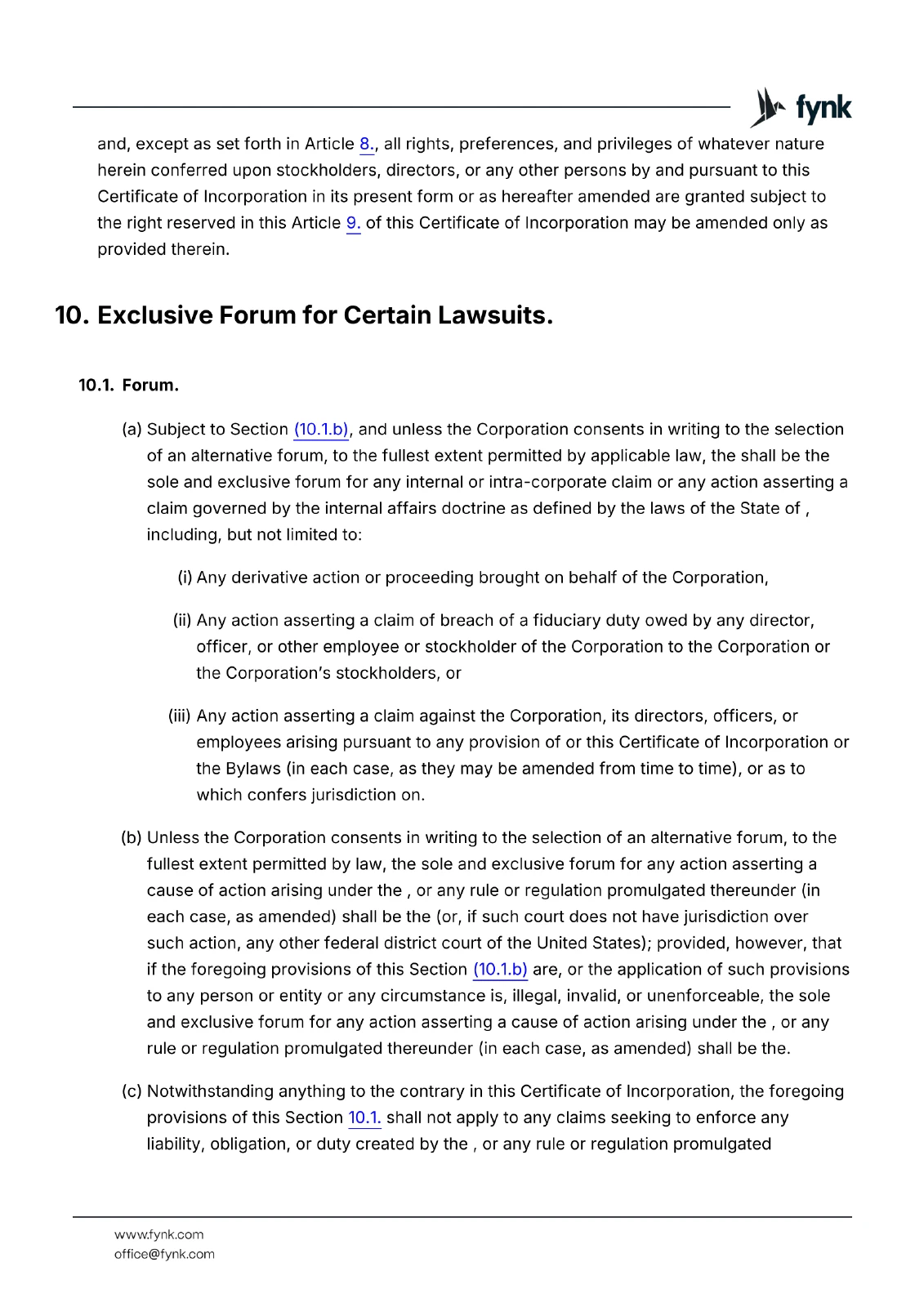Certificate of Incorporation
(Classified Board & Preferred Stock Rights)
of
a corporation
Name.
The name of the corporation is (the “Corporation”).
Purpose.
The purpose of the Corporation is to engage in any lawful act or activity for which corporations may be organized under as the same exists or may hereafter be amended. Without limiting the generality of the foregoing, the Corporation shall have all of the powers conferred on corporations by and other applicable law.
Registered Office and Agent.
The address of the Corporation’s registered office in the State of is , and the name of the Corporation’s registered agent at such address is .
Capitalization.
Authorized Capital Stock.
The total number of shares of all classes of capital stock, each with a par value of per share, which the Corporation is authorized to issue is shares, consisting of (a) shares of common stock (the “Common Stock”) and (b) shares of preferred stock (the “Preferred Stock”).
Except as otherwise provided in any certificate of designations of any series of Preferred Stock (each a “”), the number of authorized shares of the class of Common Stock or Preferred Stock may from time to time be increased or decreased (but not below the number of shares of such class outstanding) by the affirmative vote of the holders of a majority in voting power of the outstanding shares of capital stock of the Corporation irrespective of the provisions of of the .
The powers, preferences, and rights of, and the qualifications, limitations, and restrictions upon, each class or series of stock shall be determined in accordance with, or as set forth below in, this Article 4..
Common Stock.
Voting.
Except as otherwise required by law or this Certificate of Incorporation (including any ), the holders of shares of Common Stock shall exclusively possess all voting power with respect to the Corporation.
Except as otherwise required by law or this Certificate of Incorporation (including any ), the holders of shares of Common Stock shall be entitled to one vote for each such share on each matter properly submitted to the stockholders of the Corporation on which the holders of the Common Stock are entitled to vote.
Except as otherwise required by law or this Certificate of Incorporation (including any ), at any annual or special meeting of the stockholders of the Corporation, holders of shares of Common Stock shall have the exclusive right to vote for the election of directors and on all other matters properly submitted to a vote of the stockholders. Notwithstanding the foregoing, except as otherwise required by law or this Certificate of Incorporation (including any ), holders of shares of Common Stock shall not be entitled to vote on any amendment to this Certificate of Incorporation (including any amendment to any ) that relates solely to the terms of one or more outstanding series of Preferred Stock if the holders of such affected series of Preferred Stock are entitled exclusively, either separately or together with the holders of one or more other such series, to vote thereon pursuant to this Certificate of Incorporation (including any ) or .
Dividends. Subject to applicable law and the rights, if any, of the holders of any outstanding series of the Preferred Stock, the holders of shares of Common Stock shall be entitled to receive such dividends and other distributions (payable in cash, property, or capital stock of the Corporation) when, as, and if declared thereon by the Board of Directors of the Corporation (the “Board”), or any authorized committee thereof, from time to time out of any assets or funds of the Corporation legally available therefor and shall share equally on a per share basis in such dividends and distributions.
Liquidation, Dissolution or Winding Up of the Corporation.
Subject to applicable law and the rights, if any, of the holders of any outstanding series of the Preferred Stock, in the event of any voluntary or involuntary liquidation, dissolution, or winding up of the Corporation, after payment or provision for payment of the debts and other liabilities of the Corporation, the holders of shares of Common Stock shall be entitled to receive all the remaining assets of the Corporation available for distribution to its stockholders, ratably in proportion to the number of shares of Common Stock held by them.
Preferred Stock.
The Board is hereby expressly authorized, without any action or vote by the Corporation’s stockholders (except as may be provided by the terms of any class or series of Preferred Stock outstanding), to provide out of the unissued shares of the Preferred Stock for one or more series of Preferred Stock and to establish from time to time the number of shares to be included in each such series and to fix the voting rights, if any, designations, powers, preferences, and relative, participating, optional, special, and other rights, if any, of each such series and any qualifications, limitations, and restrictions thereof, as shall be stated in the resolution or resolutions adopted by the Board providing for the issuance of such series and included in a filed pursuant to , and the Board is hereby expressly vested with the authority to the full extent provided by law, now or hereafter, to adopt any such resolution or resolutions.
Board of Directors.
Board Powers.
Except as otherwise required by law or provided in this Certificate of Incorporation, the business and affairs of the Corporation shall be managed by, or under the direction of, the Board. In addition to the powers and authority expressly conferred upon the Board by statute, this Certificate of Incorporation or the Bylaws of the Corporation (“Bylaws”), the Board is hereby empowered to exercise all such powers and do all such acts and things as may be exercised or done by the Corporation, subject, nevertheless, to the provisions of , this Certificate of Incorporation, and any Bylaws adopted by the stockholders of the Corporation; provided, however, that no Bylaws hereafter adopted by the stockholders of the Corporation shall invalidate any prior act of the Board that would have been valid if such Bylaws had not been adopted.
Number, Election and Term.
The number of directors of the Corporation, other than those who may be elected by the holders of one or more series of the Preferred Stock voting separately by class or series, shall be fixed from time to time exclusively by the Board pursuant to a resolution adopted by a majority of the Board.
Subject to Section 5.5. hereof, the Board shall be divided into three classes, as nearly equal in number as possible and designated Class I, Class II, and Class III. The term of the initial Class I Directors shall expire at the first annual meeting of the stockholders of the Corporation following the effectiveness of this Certificate of Incorporation; the term of the initial Class II Directors shall expire at the second annual meeting of the stockholders of the Corporation following the effectiveness of this Certificate of Incorporation; and the term of the initial Class III Directors shall expire at the third annual meeting of the stockholders of the Corporation following the effectiveness of this Certificate of Incorporation. At each annual meeting of the stockholders of the Corporation, beginning with the first annual meeting of the stockholders of the Corporation following the effectiveness of this Certificate of Incorporation, each of the successors elected to replace the class of directors whose term expires at that annual meeting shall be elected for a term expiring at the third annual meeting of the stockholders of the Corporation thereafter and until the election and qualification of such director’s successor in office, or until his or her earlier death, resignation, or removal. Subject to Section 5.5. hereof, if the number of directors that constitutes the Board is changed, any increase or decrease shall be apportioned by the Board among the classes so as to maintain the number of directors constituting the Board in each class as nearly equal as possible, but in no case shall a decrease in the number of directors shorten the term of any incumbent director. The Board is hereby expressly authorized, by resolution or resolutions thereof, to assign members of the Board already in office to the aforesaid classes at the time this Certificate of Incorporation (and therefore such classification) becomes effective in accordance with .
Notwithstanding anything herein to the contrary, the affirmative vote of holders of not less than % of the voting power of all then outstanding shares of capital stock of the Corporation entitled to vote thereon, and the affirmative vote of holders of not less than % of the voting power of all then outstanding shares of each class entitled to vote thereon as a class, shall be required to amend or repeal any provision of this Section 5.2..
Unless and except to the extent that the Bylaws shall so require, the election of directors need not be by written ballot. The holders of shares of Common Stock shall not have cumulative voting rights.
Newly Created Directorships and Vacancies.
Subject to Section 5.5. hereof, newly created directorships resulting from an increase in the number of directors and any vacancies on the Board resulting from death, resignation, retirement, disqualification, removal, or other cause may be filled solely and exclusively by a majority vote of the remaining directors then in office, even if less than a quorum, or by a sole remaining director, and not by stockholders. Any director so chosen shall hold office for the remainder of the full term of the class of directors to which the new directorship was added or in which the vacancy occurred and until his or her successor has been duly elected and qualified, subject, however, to such director’s earlier death, resignation, retirement, disqualification, or removal. Subject to the rights, if any, of the holders of any series of Preferred Stock to elect directors, when the number of directors is increased or decreased, the Board shall, subject to Section 5.2. hereof, determine the class or classes to which the increased or decreased number of directors shall be apportioned; provided, however, that no decrease in the number of directors shall shorten the term of any incumbent director.
Removal.
From and after the effectiveness of this Certificate of Incorporation, only for so long as the Board is classified and subject to the rights of holders of Preferred Stock, any director or the entire Board may be removed from office at any time, but only for cause, and only by the affirmative vote of the holders of at least a majority of the voting power of the issued and outstanding capital stock of the Corporation entitled to vote in the election of directors.
Preferred Stock Directors.
Notwithstanding any other provision of this Article 5., and except as otherwise required by law, whenever the holders of one or more series of the Preferred Stock shall have the right, voting separately by class or one or more series thereof, to elect one or more directors, the term of office, the filling of vacancies, the removal from office (other than for cause), and other features of such directorships shall be governed by the terms of such series of the Preferred Stock as set forth in this Certificate of Incorporation (including any ), and such directors shall not be included in any of the classes created pursuant to this Article 5. unless expressly provided by such terms.
Quorum.
A quorum for the transaction of business by the directors shall be set forth in the Bylaws.
Bylaws.
In furtherance and not in limitation of the powers conferred upon it by law, the Board shall have the power and is expressly authorized to adopt, amend, alter, or repeal the Bylaws. The affirmative vote of a majority of the Board shall be required to adopt, amend, alter, or repeal the Bylaws. The Bylaws also may be adopted, amended, altered, or repealed by the stockholders of the Corporation; provided, however, that, in addition to any vote of the holders of any class or series of capital stock of the Corporation required by law or by this Certificate of Incorporation (including any ), the affirmative vote of the holders of not less than % of the voting power of all then-outstanding shares of capital stock of the Corporation entitled to vote generally in the election of directors, voting together as a single class, shall be required for the stockholders of the Corporation to adopt, amend, alter, or repeal the Bylaws; provided further, however, that if the Board recommends that stockholders approve such adoption, amendment, alteration, or repeal at such meeting of stockholders, such adoption, amendment, alteration, or repeal shall only require approval under the default voting standard as is set forth in the Bylaws, as may be amended from time to time; and provided further, however, that no Bylaws hereafter adopted by the stockholders of the Corporation shall invalidate any prior act of the Board that would have been valid if such Bylaws had not been adopted.
Special Meetings of Stakeholders; Action by Written Consent.
Special Meetings.
Only those matters set forth in the notice of a special meeting may be considered or acted upon at such special meeting of stockholders of the Corporation.
Advance Notice.
Advance notice of stockholder nominations for the election of directors and of business to be brought by stockholders before any meeting of the stockholders of the Corporation shall be given in the manner provided in the Bylaws.
Action by Written Consent.
Except as may be otherwise provided for or fixed pursuant to this Certificate of Incorporation (including any ) relating to the rights of holders of any outstanding series of Preferred Stock, any action required or permitted to be taken by the stockholders of the Corporation must be effected by a duly called annual or special meeting of such stockholders and may not be effected by written consent of the stockholders in lieu thereof. Notwithstanding anything herein to the contrary, the affirmative vote of holders of not less than % of the voting power of all then outstanding shares of capital stock of the Corporation entitled to vote thereon, and the affirmative vote of holders of not less than % of the voting power of all then outstanding shares of each class entitled to vote thereon as a class, shall be required to amend or repeal any provision of this Section 7.3..
Limited Liability; Indemnification; Insurance.
Limitation of Director and Officer Liability.
A director or officer of the Corporation shall not be personally liable to the Corporation or its stockholders for monetary damages for breach of fiduciary duty as a director or officer, except to the extent such exemption from liability or limitation thereof is not permitted under , as the same exists or may hereafter be amended. If is amended to authorize corporate action further eliminating or limiting the personal liability of directors or officers, then the liability of a director or officer of the Corporation shall be eliminated or limited to the fullest extent permitted by , as so amended. Any amendment, modification, or repeal of the foregoing sentence shall not adversely affect any right or protection of a director of the Corporation hereunder in respect of any act or omission occurring prior to the time of such amendment, modification, or repeal.
Notwithstanding anything herein to the contrary, the affirmative vote of not less than % of the voting power of all then outstanding shares of capital stock of the Corporation entitled to vote thereon, and the affirmative vote of not less than % of the voting power of all then outstanding shares of each class entitled to vote thereon as a class, shall be required to amend or repeal any provision of this Article 8..
Indemnification and Advancement of Expenses.
To the fullest extent permitted by applicable law, the Corporation is authorized to provide indemnification of (and advancement of expenses to) directors, officers, employees, and other agents of the Corporation (and any other persons to which applicable law permits the Corporation to provide indemnification) through provisions in the Bylaws, agreements with such agents or other persons, vote of stockholders or disinterested directors, or otherwise in excess of the indemnification and advancement otherwise permitted by such applicable law. The rights to indemnification and advancement of expenses conferred by this Section 8.2. and the Bylaws shall be contract rights and such rights shall continue as to an indemnitee who has ceased to be a director, officer, employee, or agent and shall inure to the benefit of his or her heirs, executors, and administrators.
Insurance.
The Corporation shall have power to purchase and maintain insurance on behalf of any person who is or was a director, officer, employee, or agent of the Corporation, or is or was serving at the request of the Corporation as a director, officer, employee, or agent of another corporation or of a partnership, joint venture, trust, other enterprise, or nonprofit entity, against all liability and loss suffered and expenses incurred by such person in any such capacity or arising out of such person’s status as such, whether or not the Corporation would have the power to indemnify such person against such liability, loss, or expense under .
Amendment of Certificate of Incorporation.
The Corporation reserves the right at any time and from time to time to amend, alter, change, or repeal any provision contained in this Certificate of Incorporation (including any ), and other provisions authorized by the laws of the State of at the time in force that may be added or inserted, in the manner now or hereafter prescribed by this Certificate of Incorporation and ; and, except as set forth in Article 8., all rights, preferences, and privileges of whatever nature herein conferred upon stockholders, directors, or any other persons by and pursuant to this Certificate of Incorporation in its present form or as hereafter amended are granted subject to the right reserved in this Article 9. of this Certificate of Incorporation may be amended only as provided therein.
Exclusive Forum for Certain Lawsuits.
Forum.
Subject to Section (10.1.b), and unless the Corporation consents in writing to the selection of an alternative forum, to the fullest extent permitted by applicable law, the shall be the sole and exclusive forum for any internal or intra-corporate claim or any action asserting a claim governed by the internal affairs doctrine as defined by the laws of the State of , including, but not limited to:
Any derivative action or proceeding brought on behalf of the Corporation,
Any action asserting a claim of breach of a fiduciary duty owed by any director, officer, or other employee or stockholder of the Corporation to the Corporation or the Corporation’s stockholders, or
Any action asserting a claim against the Corporation, its directors, officers, or employees arising pursuant to any provision of or this Certificate of Incorporation or the Bylaws (in each case, as they may be amended from time to time), or as to which confers jurisdiction on.
Unless the Corporation consents in writing to the selection of an alternative forum, to the fullest extent permitted by law, the sole and exclusive forum for any action asserting a cause of action arising under the , or any rule or regulation promulgated thereunder (in each case, as amended) shall be the (or, if such court does not have jurisdiction over such action, any other federal district court of the United States); provided, however, that if the foregoing provisions of this Section (10.1.b) are, or the application of such provisions to any person or entity or any circumstance is, illegal, invalid, or unenforceable, the sole and exclusive forum for any action asserting a cause of action arising under the , or any rule or regulation promulgated thereunder (in each case, as amended) shall be the.
Notwithstanding anything to the contrary in this Certificate of Incorporation, the foregoing provisions of this Section 10.1. shall not apply to any claims seeking to enforce any liability, obligation, or duty created by the , or any rule or regulation promulgated thereunder (in each case, as amended).
Miscellaneous.
Severability.
If any provision or provisions (or any part thereof) of this Certificate of Incorporation shall be held to be invalid, illegal, or unenforceable as applied to any person or entity or circumstance for any reason whatsoever, then, to the fullest extent permitted by law:
The validity, legality, and enforceability of such provisions in any other circumstance and of the remaining provisions of this Certificate of Incorporation (including, without limitation, each portion of any paragraph of this Certificate of Incorporation containing any such provision held to be invalid, illegal, or unenforceable that is not itself held to be invalid, illegal, or unenforceable) and the application of such provision to other persons or entities and circumstances shall not in any way be affected or impaired thereby, and
The provisions of this Certificate of Incorporation (including, without limitation, each portion of any paragraph of this Certificate of Incorporation containing any such provision held to be invalid, illegal, or unenforceable) shall be construed so as to permit the Corporation to protect its directors, officers, employees, and agents from personal liability in respect of their good faith service or for the benefit of the Corporation to the fullest extent permitted by law.
Notice and Consent.
To the fullest extent permitted by law, any person or entity purchasing or otherwise acquiring or holding any interest in shares of capital stock of the Corporation shall be deemed to have notice of and consented to the provisions of this Certificate of Incorporation.
IN WITNESS WHEREOF, the Corporation has caused this Certificate of Incorporation to be duly executed and acknowledged in its name and on its behalf by an authorized officer as of the date first set forth above.

